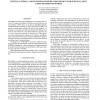244 search results - page 41 / 49 » Location-unaware coverage in wireless sensor networks |
IJSNET
2006
14 years 9 months ago
2006
: To extend the functional lifetime of battery-operated Wireless Sensor Networks (WSNs), stringent sleep scheduling strategies with communication duty cycles running at sub-1% rang...
SENSYS
2006
ACM
15 years 3 months ago
2006
ACM
Varying interference levels make broadcasting an unreliable operation in low-power wireless networks. Many routing and resource discovery protocols depend on flooding (repeated pe...
61
Voted
AINA
2007
IEEE
15 years 1 months ago
2007
IEEE
Abstract--Monitoring and automatic control of building environment is a crucial application of Wireless Sensor Network (WSN) in which maximizing network lifetime is a key challenge...
IJSNET
2006
14 years 9 months ago
2006
: In this paper, we present a two-tiered scheduling approach for effective energy conservation in wireless sensor networks. The effectiveness of this mechanism relies on dynamicall...
IPSN
2005
Springer
15 years 3 months ago
2005
Springer
Surveillance has been a typical application of wireless sensor networks. To conduct surveillance of a given area in real life, one can use stationary watch towers, or can also use...

